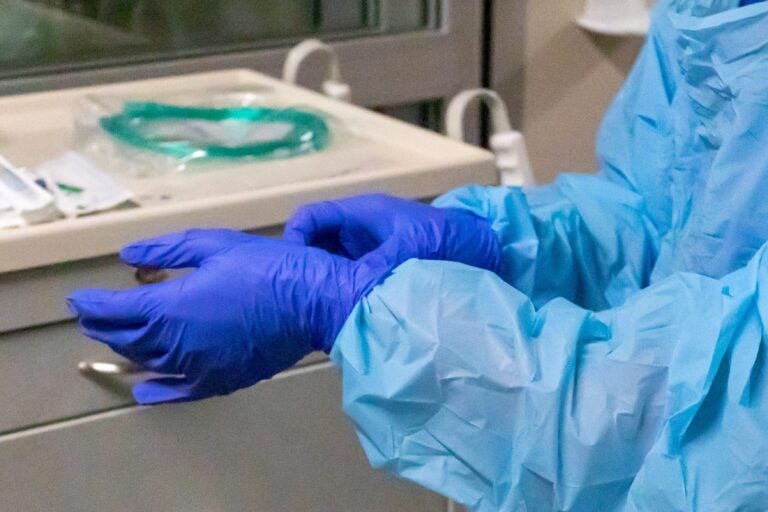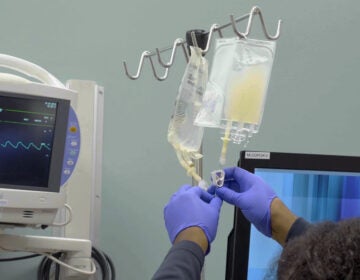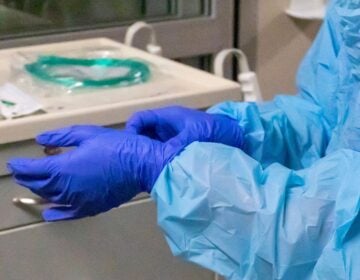N.J. lawmakers want to address the growing shortage of nurses and other health care workers
New Jersey lawmakers are considering a bill to let out-of-state nurses and other health care professionals work without final license approval for a year.

A nurse adjusts her gloves in a hospital in 2021. (Mike Zacchino/KDRV via AP, Pool)
From Camden and Cherry Hill to Trenton and the Jersey Shore, what about life in New Jersey do you want WHYY News to cover? Let us know.
New Jersey has a growing scarcity of health care workers, and elected officials want to address the problem.
Lawmakers are working on a bill that would authorize certain out-of-state professionals and recent graduates of training programs to practice in the Garden State without a final determination on their licensure or certification application.
Under the bill approved by the state Senate Commerce Committee, qualified alcohol and drug counselors, marriage and family therapists, professional counselors, physicians, homemaker-home health aides, certain nurses, psychologists, psychoanalysts, respiratory care practitioners and social workers licensed or certified to practice in another state who apply for a license or certification in New Jersey will be authorized to practice in-state for up to one year, pending a final determination on their application.
The measure, which has already been approved by the General Assembly, now heads to the full Senate for consideration.
Judy Schmidt, CEO of the New Jersey State Nurses Association, strongly supports the plan. She said Jersey is part of a compact that allows nurses from 41 other states to work in the Garden State, but Pennsylvania is not part of that agreement.
“So our counties that are adjacent to the Pennsylvania area would now have those nurses that would be able to work in some of those hospitals,” she said. “And then when we look at New York, which also is not part of the compact, it would allow nurses to come over from New York.”
Mary Abrams, senior health policy analyst for the New Jersey Association of Mental Health and Addiction Agencies, said the Senate proposal would also help relieve shortages of drug and alcohol counselors, therapists and social workers.
“These people have very difficult, very stressful jobs, and the caseloads just keep growing, it’s just hard to get people into that pipeline,” she said.
Low salaries, high stress contributing to the shortage of nurses
A report by the New Jersey Collaborating Center for Nursing projects a 10% shortage of registered nurses and a 7% shortage of licensed practical nurses in the Garden State by next year. The same report also finds Jersey will be one of 10 states with the largest projected RN shortage in the nation by 2036.
Schmidt said the Garden State has had a nursing shortage for many years.
“Our turnover rate for nurses is quite high and we need to work on that,” she said. “A lot of it has to do with, of course, salaries, and also the workplace itself. Is that workplace something where a nurse would want to work in?”
She said people don’t become nurses to make a lot of money, “but when they start to work and they see the stress, the additional hours they’re working, compensation does play into it.”
Abrams said during the COVID-19 pandemic, many health care professionals in the behavioral health sector participated in what became known as the “Great Resignation,” and one main issue was, and continues to be, the lack of reasonable compensation.
“The rates that are paid, we cannot compete, we could not compete with McDonald’s, you have Costco paying $30 to $32 an hour for their staff right now,” she said.
She said shortages of these workers have continued, even as demand for health care, child and senior care and social services has increased, along with operational costs.
“Our providers estimate they are 33% to 40% short of covering the cost of care,” she said.
She said a difficult situation is now worse, with the growing number of federal programs that have either been frozen or are facing funding cuts.
“There’s an immense, immense impact on mental health and substance use, and on health care overall for the state, and for all states, should they start making cuts to Medicaid,” Abrams said.
The New Jersey Collaborating Center for Nursing report outlined key drivers to improve New Jersey’s health care system. Recommendations include investing in and expanding the nursing education system, boosting retention efforts, leveraging technology and telehealth solutions. The report also calls for policies that ensure all nurses work to the full extent of their licensure and education and engaging retired nurses to return to the workforce.

Get daily updates from WHYY News!
WHYY is your source for fact-based, in-depth journalism and information. As a nonprofit organization, we rely on financial support from readers like you. Please give today.







